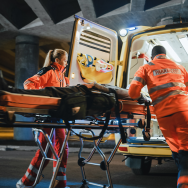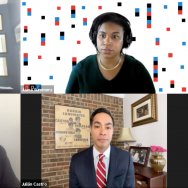Transform911, an initiative led by the University of Chicago Health Lab to rethink the nation’s emergency response system, released a comprehensive policy blueprint to modernize and strengthen America’s 911 system and change behaviors of those who both implement and rely upon it.
The event took place June 29 in New Orleans, and included speakers such as Katherine Baicker, dean and Emmett Dedmon Professor at UChicago's Harris School of Public Policy, and elected officials and law enforcement officials from across the country.
Developing the recommendations—which were open to public input—represents the culmination of more than 18 months of work that involved more than 100 experts in law enforcement, public health, emergency response, government, technology, justice, academia and philanthropy.
The nation’s 54-year-old 911 system currently functions through a patchwork of thousands of locally operated emergency communications centers, with oversight and support split across a maze of federal, state, and local agencies. Experts say the lack of common standards for workforce training and support, data collection and reporting, and technology interoperability—combined with the lack of federal funding to address these challenges—means that while reliance on 911 is constant across America, the response is highly variable.
“It’s clear that the times call for the most comprehensive overhaul of the nation’s 911 system ever, to ensure that the right professional responds to an emergency call at the right time,” said S. Rebecca Neusteter, executive director of the University of Chicago Health Lab and principal investigator of Transform911. “Recent events highlight that policymakers at all levels of government must identify, debate, and implement changes to the emergency response system. It’s a matter of life or death.”
The Health Lab is one of five labs that comprise University of Chicago Urban Labs. Together they work to address challenges across key dimensions of urban life: crime, education, health, poverty, and energy & environment. The University of Chicago Urban Labs is part of the University of Chicago Harris School of Public Policy.
Data show only 25% of the estimated 240 million calls made annually to the nation’s emergency communications centers relate to a crime in progress, but the default mechanism for most is to initiate a police response, even when police may be more needed elsewhere. A growing number of communities nationwide are exploring alternatives to a traditional 911 police response, but experts say issues run far deeper than who is deployed to respond to a call.
Transform911 recommendations include:
- Create a cabinet-level position to report to the U.S. President on urgent 911 improvements. America’s 911 system currently functions through more than 6,000 local emergency communications centers with various levels of oversight and support. Experts say the federal government must set national standards for 911 training, technology, and data-sharing.
- Create a federal task force on 911 data and technology ethics. Innovations in technology have improved emergency response capabilities, but experts say there needs to be consistent standards on the security and privacy of 911 calls and related data.
- Support an expert, well-resourced 911 workforce. Experts say that like other public safety professionals, the 911 workforce must have access to high-quality and consistent training, and state-of-the-art technologies that aid them in their work.
- Make 911 independent and equal—on par with other public safety departments. Most 911 emergency call centers report to other public safety organizations they serve. Experts recommend that 911 centers have autonomy to address and report public safety issues in a manner they deem appropriate, without being subordinate to EMS, fire, police, or other public safety entities.
- Embed community perspectives in improving 911 response. 911 is a vital public resource but many people—especially those of color—have grown mistrustful of its services. Experts say building relationships between local 911 professionals and the community they serve is essential for making the system more equitable and trusted.
- Reintroduce 911 to the American public. Experts say too many people think 911 is a switchboard service staffed by operators, rather than a highly skilled public safety response deployed by trained professionals. An awareness campaign reintroducing 911 would instill greater confidence in the nation’s emergency response capabilities and assist in bolstering a career pipeline for 911 professionals.
“The time to update and transform the emergency response model in the United States is now,” said Walter Katz, vice president of criminal justice at Arnold Ventures. “Local communities and the country need a comprehensive, transparent, and innovative approach to strengthen the 911 system. These recommendations help establish a more effective, equitable, uniform emergency response that protects public health and safety.”
The recommendations were presented at a convening in New Orleans, with enthusiastic endorsement from members of Congress; staff from the NAACP; 911 professionals from around the nation; leaders of the National Association of State 911 Administrators; chiefs of police, sheriffs, and public staff and advocates from Albuquerque, Atlanta, New Orleans, Sarasota, Tucson, and elsewhere; local and state elected officials; and other stakeholders interested in transforming emergency response in the United States.
Transform911 is supported by Arnold Ventures, Microsoft Justice Reform Initiative, the Sozosei Foundation and the Wagner Foundation. See the full recommendations at the Transform911 website.
—This story was first published by the Harris School of Public Policy.

